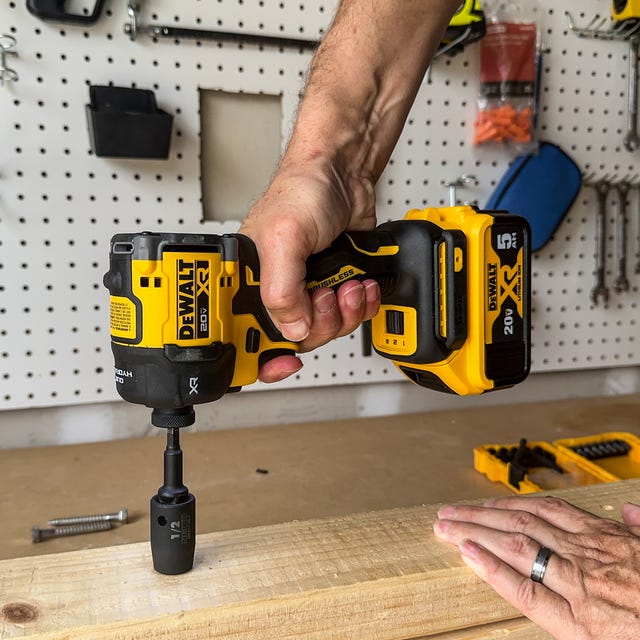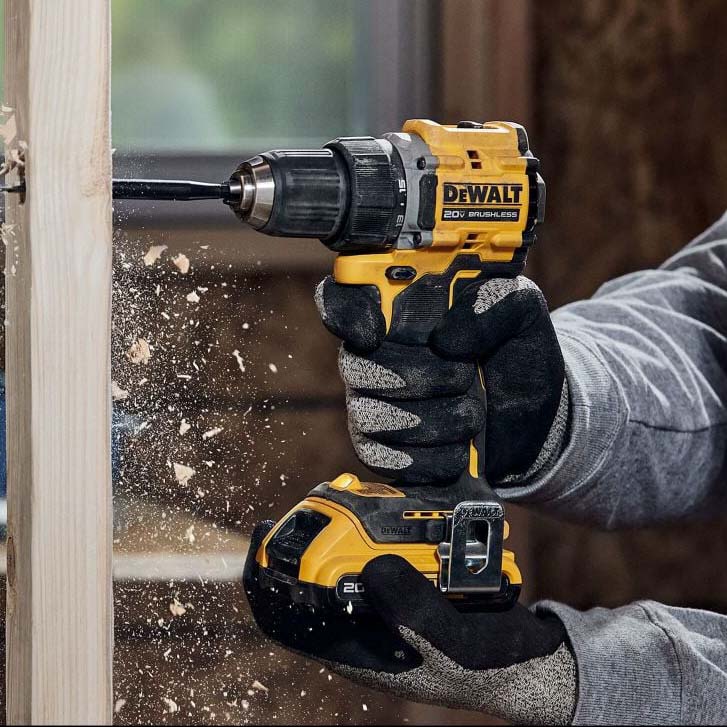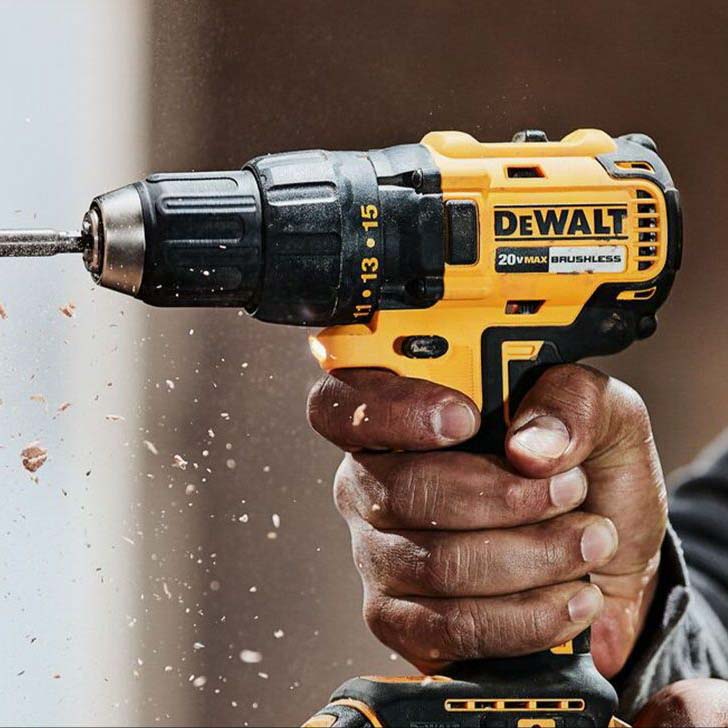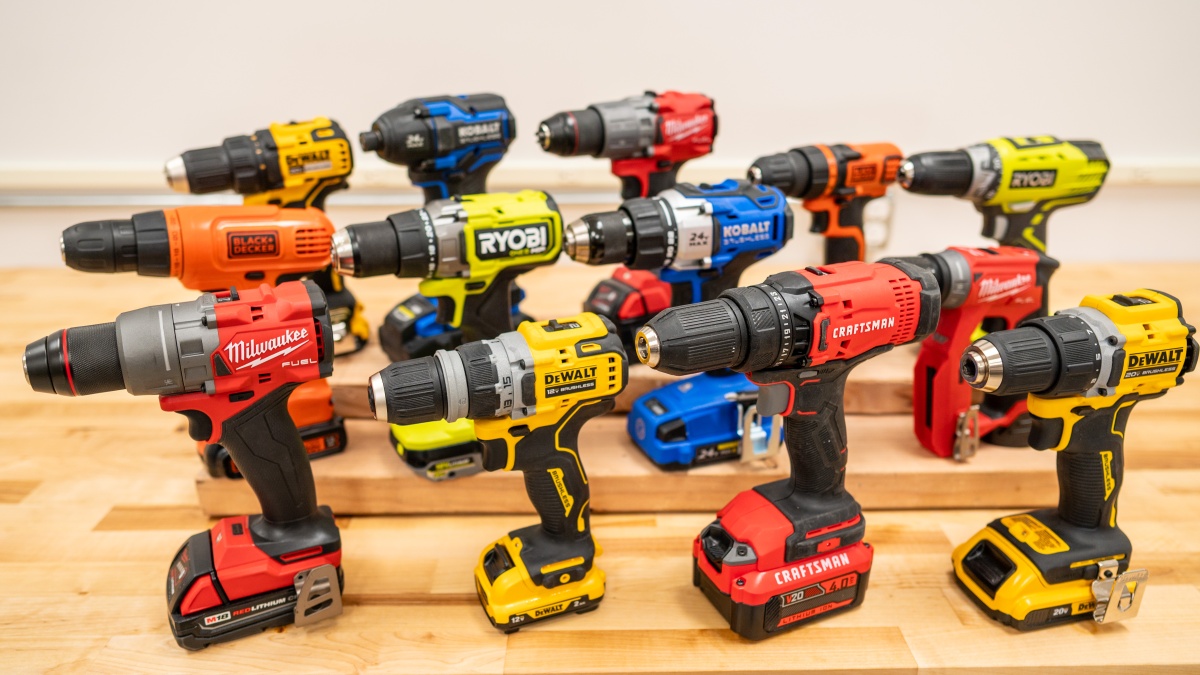Looking for the best cordless drill to tackle your home projects? You want a tool that’s powerful, easy to use, and reliable.
Whether you’re hanging shelves, fixing furniture, or starting a DIY project, having the right drill makes all the difference. In this guide, you’ll discover top cordless drills that fit your needs and budget. Keep reading to find the perfect drill that will make your work faster, easier, and more enjoyable.
Your next project deserves the best—let’s find it together!
Key Features To Consider
Choosing the best cordless drill for your home projects depends on several important features. Knowing what to look for helps you pick a drill that fits your needs.
Focus on power, battery life, weight, speed, and durability to find a reliable tool. These features affect how well the drill performs and how comfortable it is to use.
Power And Torque
Power shows how strong the drill is, and torque measures twisting force. Higher torque helps drill through tough materials like wood or metal.
Look for drills with adjustable torque settings. This lets you control the force to avoid damaging screws or materials.
- Higher power suits heavy tasks
- Lower power is fine for light work
- Adjustable torque prevents overdriving screws
Battery Life And Charging
Battery life tells how long the drill runs before needing a recharge. Longer battery life means less interruption during work.
Check the charging time too. Faster charging helps you get back to work quickly. Lithium-ion batteries are common and last longer.
- Look for at least 1.5 to 2 hours runtime
- Short charging time saves waiting
- Extra batteries can help during long tasks
Weight And Ergonomics
Weight affects how easy it is to hold and use the drill. A lighter drill reduces fatigue during long jobs.
Ergonomic design means the drill fits well in your hand. Look for comfortable grips and balanced weight to improve control.
- Choose lightweight models for comfort
- Soft grips reduce hand strain
- Good balance helps accuracy
Speed Settings
Speed controls how fast the drill spins. Multiple speed settings let you adjust for different tasks like drilling or driving screws.
Lower speeds work well for screws and precise jobs. Higher speeds are better for drilling holes in wood or metal.
- Two-speed settings cover most tasks
- Variable speed triggers offer fine control
- Match speed to the material and task
Durability And Build Quality
Durability means the drill lasts through tough jobs and accidental drops. Good build quality protects internal parts and the battery.
Look for drills with strong casing and well-made components. Some models offer water and dust resistance for outdoor work.
- Sturdy housing prevents damage
- Metal gears last longer than plastic
- Sealed parts resist dust and moisture
Top Cordless Drills For Beginners
Choosing the right cordless drill can make home projects easier. Beginners need tools that are simple and reliable.
This guide highlights drills with good value, easy use, and basic features for new users.
Affordable Options
Many cordless drills offer good quality without a high price. Affordable drills help beginners start without spending too much.
These models usually have enough power for common home tasks and come from trusted brands.
- Price under $100
- Includes basic battery and charger
- Good customer reviews for value
User-friendly Designs
Drills with simple controls help beginners learn faster. Look for models with clear buttons and easy grip.
Lightweight drills reduce hand fatigue during use. Some have LED lights to help see dark areas.
- Ergonomic handles
- Intuitive speed settings
- Built-in work lights
- Compact size
Basic Functionality
Beginners need drills that handle simple tasks well. Models with adjustable speed and torque help control the drill.
Standard drill bits fit most tasks like drilling holes or driving screws. A reliable battery life keeps projects moving.
| Feature | Why It Matters |
|---|---|
| Adjustable Speed | Controls drilling power for different materials |
| Torque Settings | Prevents overdriving screws |
| Standard Chuck Size | Fits common drill bits |
| Battery Life | Allows longer work time without charging |
Best Drills For Intermediate Diyers
Choosing the right cordless drill is important for homeowners who like to do projects themselves. Intermediate DIYers need tools that offer good power and useful features.
This guide will help you understand what makes a drill great for your home projects. Look for drills that balance power, features, and versatility.
Enhanced Power
Intermediate DIYers need drills with enough power to handle wood, metal, and plastic. Cordless drills with higher voltage batteries give longer run time and stronger performance.
Brushless motors last longer and deliver more torque. This helps you work faster and with less effort on tough materials.
- Look for 18V or 20V lithium-ion batteries
- Brushless motors increase efficiency
- Higher torque helps with thick or hard materials
Additional Features
Extra features make drilling easier and safer. Many drills come with built-in LED lights to brighten dark work areas. Some have adjustable speed settings for different tasks.
Keyless chucks allow quick bit changes without extra tools. A comfortable grip reduces hand fatigue during long projects.
- LED lights improve visibility
- Variable speed control for precision
- Keyless chuck for fast bit swaps
- Ergonomic handles for comfort
Versatility
A versatile drill can handle many tasks around the house. Look for models that offer both drilling and driving functions. Some drills include multiple clutch settings to prevent overdriving screws.
Interchangeable batteries and compatibility with other tools add value. A drill that works well with different attachments will save money and space.
- Drill and driver modes for different jobs
- Multiple clutch settings for control
- Battery compatibility with other tools
- Supports various drill bits and attachments

Credit: www.popularmechanics.com
Professional-grade Drills For Homeowners
Cordless drills are essential tools for homeowners. They help with many tasks around the house.
Professional-grade drills offer power and durability. They make home projects easier and faster.
High Performance
Professional drills deliver strong torque and speed. This helps drill through tough materials quickly.
These drills often have multiple speed settings. Users can adjust speed for different jobs and materials.
- High torque for drilling hard surfaces
- Variable speed control for precision
- Strong motor for consistent power
Advanced Battery Technology
Modern drills use lithium-ion batteries. They last longer and charge faster than older batteries.
These batteries are lightweight and safe. They keep the drill running for hours on a single charge.
- Long battery life for extended use
- Fast charging to reduce downtime
- Lightweight design for easy handling
Robust Construction
Professional-grade drills have strong builds. They resist wear and tear from regular use.
Durable materials protect the drill’s internal parts. This improves tool lifespan and reliability.
- Impact-resistant housing for protection
- Ergonomic grip for comfort and control
- Sealed components to keep out dust and debris
Battery Types And Maintenance
Cordless drills need good batteries for best use. Knowing battery types helps you keep drills ready.
Proper battery care makes your drill last longer. It saves money and keeps power strong.
Lithium-ion Vs. Nimh
Lithium-ion (Li-ion) batteries are common in drills. They are light and hold charge well.
Nickel-metal hydride (NiMH) batteries are older. They are heavier and lose charge faster than Li-ion.
- Li-ion batteries have no memory effect
- NiMH batteries may need full discharge before charging
- Li-ion lasts longer per charge cycle
- NiMH batteries cost less but need more care
Charging Tips
Use the charger made for your battery type. Wrong chargers can damage batteries.
Do not overcharge batteries. Unplug the charger once the battery is full.
- Charge batteries at room temperature
- Do not leave batteries on the charger for days
- Charge batteries before first use and after long storage
- For NiMH, let the battery cool before charging again
Storage Advice
Store batteries in a cool, dry place. Avoid places with high heat or moisture.
Keep batteries partially charged when storing long term. Do not store fully empty or full.
- Remove batteries from drills when not in use
- Check battery charge every few months
- Recharge if charge drops below 40%
- Do not freeze batteries

Credit: www.protoolreviews.com
Safety Tips For Cordless Drill Use
Using a cordless drill at home is common for many projects. It is important to follow safety tips to avoid accidents.
Simple safety steps help protect you and your tools during work.
Proper Handling
Hold the drill firmly with both hands. Keep your fingers away from the drill bit.
Always turn off the drill before changing bits or moving it. Use the right drill bit for your project.
- Keep a steady grip on the drill
- Point the drill away from your body
- Do not force the drill into the material
- Use the correct speed setting for the task
Protective Gear
Wear safety glasses to protect your eyes from dust and debris. Use ear protection if the drill is loud.
Wear gloves to protect your hands but make sure they fit well. Avoid loose clothing that can get caught in the drill.
- Safety glasses or goggles
- Hearing protection like earplugs or earmuffs
- Close-fitting gloves
- Avoid loose sleeves or jewelry
Maintenance Checks
Regularly check your cordless drill for damage. Look at the battery, chuck, and drill bits before use.
Clean the drill and store it in a dry place. Replace worn or damaged parts to keep it safe.
- Inspect the battery for cracks or leaks
- Make sure the chuck holds bits tightly
- Keep drill bits sharp and clean
- Store drill in a cool, dry place
Accessories To Enhance Your Drill
Choosing the right accessories can make your cordless drill more useful. They help you do more jobs with ease.
Some accessories improve how you store and carry the drill. Others give you extra power or add new functions.
Drill Bits
Drill bits are the parts that cut into wood, metal, or other materials. Different bits work for different tasks.
Having a variety of bits lets you do many jobs without buying new tools. It saves time and effort.
- Wood bits for drilling into wood
- Masonry bits for concrete or brick
- Metal bits for steel and other metals
- Specialty bits like spade or hole saws
Carrying Cases
A carrying case keeps your drill and accessories safe and organized. It also makes transport easier.
Look for cases with extra pockets. They help store bits, batteries, and chargers all in one place.
- Hard cases protect from drops and dust
- Soft cases are lightweight and easy to carry
- Custom inserts keep tools from moving
- Handles and straps add carrying comfort
Additional Batteries
Extra batteries let you work longer without stopping. You can swap batteries and keep drilling.
Choose batteries that match your drill brand and model. Check their capacity for longer run time.
- Have at least one spare battery ready
- Use fast chargers to reduce waiting time
- Store batteries in cool, dry places
- Keep battery contacts clean for best performance
Budgeting For Your Drill Purchase
Buying a cordless drill needs careful budgeting. Knowing your budget helps you pick the right drill.
A good budget balances what you want and what you can spend.
Balancing Cost And Quality
Cheap drills may save money but might not last long. High-quality drills cost more but work better.
Think about how often you will use the drill. A strong drill is better for frequent use.
- Set a price range before shopping
- Look for drills with good reviews
- Check the drill’s power and battery life
Where To Buy
You can buy drills at stores or online. Each option has its own benefits.
Stores let you see the drill and ask questions. Online shops often have more choices and lower prices.
- Home improvement stores
- Online retailers
- Specialty tool shops
Warranty And Support
Check the drill’s warranty before buying. A good warranty protects you from defects and issues.
Also, find out about customer support. Quick help can save time if problems happen.
- Length of the warranty period
- What the warranty covers
- Availability of customer service

Credit: www.protoolreviews.com
Frequently Asked Questions
What Features Should I Look For In A Cordless Drill?
Look for battery life, torque, speed settings, and weight. A compact, lightweight drill with adjustable speeds suits most home tasks. Also, check for ergonomic design and included accessories like drill bits for better value.
How Long Does A Cordless Drill Battery Typically Last?
Battery life varies, usually lasting 1 to 3 hours of continuous use. Lithium-ion batteries hold charge longer and recharge faster than older types. Always keep a spare battery for uninterrupted work during larger projects.
Are Cordless Drills Good For Heavy-duty Tasks?
Cordless drills can handle many heavy-duty tasks, but not all. For extreme jobs, choose drills with high torque and brushless motors. Consider corded drills for prolonged, intense use to avoid battery limitations.
How Important Is Drill Speed For Homeowners?
Drill speed affects performance and precision in tasks. Variable speed allows control for delicate or tough materials. Look for models with adjustable speed settings to handle diverse home projects efficiently.
Conclusion
Selecting the right cordless drill simplifies home projects. Each drill offers unique features. Consider power, battery life, and design. Evaluate your needs. Lightweight drills suit small tasks. Heavy-duty drills handle bigger jobs. Compare prices for the best value. Check user reviews for insights.
A good drill enhances efficiency and convenience. Make an informed choice. Enjoy seamless DIY experiences. Your toolbox deserves the best cordless drill. Happy drilling!
11 min read

